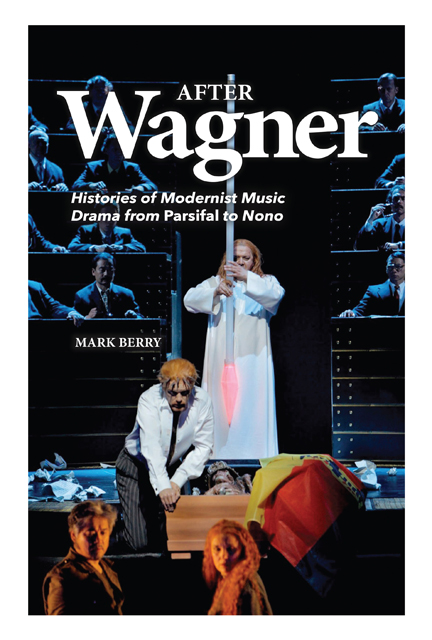Book contents
- Frontmatter
- Contents
- List of Music Examples
- Acknowledgements
- Dedication
- Introduction: ‘After Wagner’
- Part I In the Shadow of German Idealism: From Parsifal to Capriccio
- Part II Composition after the Second World War: From Germany to Italy, and Back Again?
- Part III Performance and the Fruitful Instability of the Work: From Parsifal to Nono
- Bibliography
- Index
Part III - Performance and the Fruitful Instability of the Work: From Parsifal to Nono
Published online by Cambridge University Press: 24 February 2023
- Frontmatter
- Contents
- List of Music Examples
- Acknowledgements
- Dedication
- Introduction: ‘After Wagner’
- Part I In the Shadow of German Idealism: From Parsifal to Capriccio
- Part II Composition after the Second World War: From Germany to Italy, and Back Again?
- Part III Performance and the Fruitful Instability of the Work: From Parsifal to Nono
- Bibliography
- Index
Summary
Prelude
The first two parts of this book having been organised broadly chronologically, the third part will look more to after-lives, to performative reception, to some of the process of writing history and histories. Such matters have not of course been absent earlier; they may now, however, move centre-stage. ‘Working’ is shown in the treatment of Stefan Herheim’s Bayreuth production of Parsifal, opportunities to see that staging in three different seasons having afforded a further opportunity to look back at the progression of my thoughts on work and staging, and also to bring that cumulative experience together through further reflection. That chapter might therefore seem something of an exception, but insofar as it is, exceptionality pertains to style rather than idea. Discussion of Herheim’s Parsifal remains and indeed participates in a context of what we might learn about musical dramas and their status as artworks, both in and through history.
Parsifal, as already discussed, is in many respects an unusual or, perhaps more accurately, an extreme work. That characteristic of extremity certainly holds for issues of performance, since, as William Kinderman has pointed out, the work’s ‘special position … is closely bound up with the renewal of the Bayreuth Festival in 1882’. What Kinderman unassumingly calls an ‘unusual performance restriction’ had the consequence of confining the work to Bayreuth. That restriction pertained until its flouting in the so-called theft of the Grail by New York in 1903 – the United States not being a signatory to the Berne Convention – and the expiry of copyright shortly before the outbreak of war: the terminus, as we shall see, for Herheim’s first act. Though unsuccessful, Cosima’s bizarre, if far from financially disinterested, attempt to have the Reichstag pass a ‘Lex Parsifal’, restricting the work to the temple of Bayreuth in perpetuity, gained support not only from Strauss, who as a conductor had obvious reason to remain in favour with Wahnfried and who spent eight days lobbying the Reichstag, but from farther afield too; petition signatories included Gustave Charpentier and Puccini. Not until 1934 would Bayreuth itself mount a new production, though some changes had been made to the ‘original’ in the meantime. ‘The notion of Urtext’ could therefore, in this almost unprecedented situation for a repertoire work, be understood as applying to the staging too.
- Type
- Chapter
- Information
- After WagnerHistories of Modernist Music Drama from Parsifal to Nono, pp. 205 - 209Publisher: Boydell & BrewerPrint publication year: 2014



